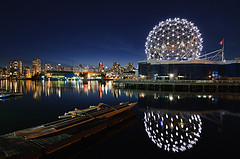Jason Gerbsch Approximately 220 words
jg33@geneseo.edu
INTD 105-19: Scientific Writing
In his essay, “The Trouble with Wilderness”, Cronon states that the American wilderness is not very natural, more so a construct of man. He makes two points supporting his view of a constructed wilderness, romanticism and the frontier. During the colonial eras and the beginning of America, the term wilderness was a word that instilled terror. Romanticism changed this early on by changing the concept of wilderness from a place of terror, to a place of sacredness. Romantics tied the wilderness and religion together, using faith to describe the wilderness as places of heavenly beauty and places to be close to God. The frontier aspect painted the wild as a place of not only religious significance, but also a place for experiencing what it meant to be an American. Both movements in American history led to the protection of nature not for the sake of protecting it, but for creating places where people can go to abandon their homes in civilization for a time in exchange for a false “home” in nature, where they truly “belong”.
This idea of falsifying nature in order to appease our desire to separate ourselves from civilization I can see with Sturges Hall. The building, a sign of civilization, covered on ivy in order to appear “natural.”

Awesome job incorporating history and religion into your mini essay. Really enjoyed how you explained Cronon’s ideas thoroughly and in your own perspective. Connecting back to your object further supported your ideas. Great job!
Clear, concise explanation of how Romanticism altered how one perceives the wilderness around them. Nice job!
The ivy on Sturges brings up a question for me. Are humans intentionally covering the building with ivy to falsify its position in nature? Or has the ivy simply grown there without being a product of humans? Either way, we should stop viewing the ivy on buildings as human and the ivy in the forest as natural, according to the false dualism Cronon exposes.
I like how you focused on the illusion of escape offered by nature and then tied this deception to your object. The ivy does seem natural at first glance, and it’s interesting to think about the human culture that may or may not have influenced it.